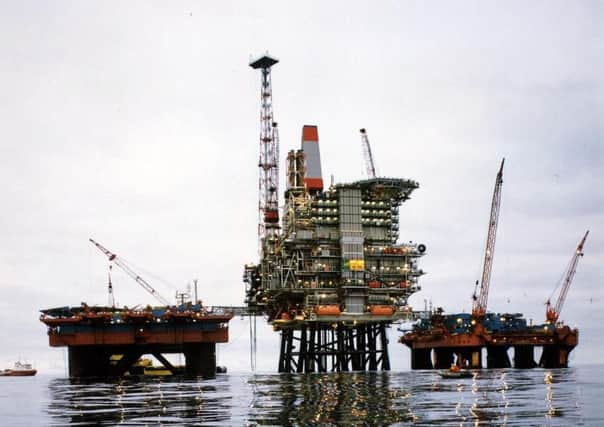SNP urged to say sorry as North Sea revenues plunge


Revenues from North Sea oil and gas have plummeted to a record low since production came fully on-stream in the late 1970s as the impact of the global price crash takes its toll.
The Treasury is poised to collect just £130 million in taxes from oil firms this year, according to the Office for Budget Responsibility.
Advertisement
Hide AdAdvertisement
Hide AdThis is down 94 per cent on last year when £2.2 billion was collected. It compares with £7.5 billion which the SNP predicted for this year in its White paper on Scottish independence during the referendum campaign.
Chancellor George Osborne said this would have been devastating for the fledgling Scottish state, while opposition parties accused the SNP of deceit over the oil figures.
Mr Osborne said yesterday: “Of course, if Scotland had voted for independence, they would have had their own Spending Review this autumn.
“With world oil prices falling, and revenues from the North Sea forecast by the OBR to be down 94 per cent, we would have seen catastrophic cuts to Scottish public services.
“Thankfully, Scotland remains a strong part of a stronger United Kingdom. So the Scottish block grant will be over £30 billion in 2019-20 – while capital spending available will rise by £1.9 billion through to 2021.”
Labour MSP Jackie Baillie called for the SNP to “apologise to the Scottish people for misleading everybody on oil”. “These figures expose the stark reality of the consequences of the SNP’s plan for separation,” she said. “The scale of the cuts that would have been required to budgets for our schools and hospitals had the SNP got their way is simply unimaginable.”
Scottish finance secretary John Swinney will set out his own budget for 2015/16 next month. If Scots had voted Yes in the referendum last year, it would have been his last before independence was formally enacted in March 2016.
Liberal Democrat leader Willie Rennie said: “John Swinney should thank his lucky stars it’s not him up there delivering a budget for an independent Scotland.
Advertisement
Hide AdAdvertisement
Hide Ad“His predictions of a second oil boom have gone bust. The 94 per cent cut in oil revenues would have starved our NHS, schools and police of billions of pounds in a separate Scotland.”
About 65,000 jobs have been axed in the North Sea oil and gas industry and its wider supply chain as major energy firms cut their costs to alleviate the impact of the fall in global oil prices. This now stands at about $50 a barrel compared with about $110 in the Summer of last year.
A spokesman for Mr Swinney said last night: “It is the Tories who should be apologising for their part in not saving a single penny of Scotland’s vast oil revenues over the last 40 years - and for now scrapping the £1 billion carbon capture plans which could have brought a major economic and jobs boost to Peterhead and the north east of Scotland.
“The reality is the UK government forecasts for oil prices were higher than the Scottish Government’s in the run-up to the referendum.
“Scotland remains the biggest oil producer in the EU - and even without oil, Scotland’s output per head ranks third of the 12 countries and regions of the UK, behind only London and the South East.”
Mike Tholen, Oil & Gas UK’s economics director, said further tax breaks may be needed to reverse the industry’s fortunes.
“If the oil price continues to be lower for longer, there is little doubt that alongside industry’s own concerted effort to improve its efficiency, we will need to work with Treasury on additional measures, including revisiting the current headline tax rate - consistent with the government’s commitment to the sector’s tax rate falling over time,” he said.